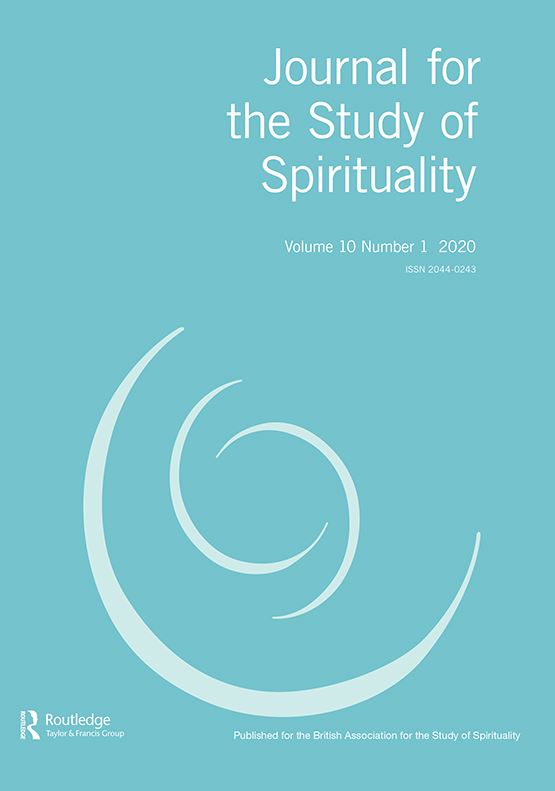International Network for the Study of Spirituality
Journal for the Study of Spirituality: Scope, purpose, and the reviewing process
JSS is Abstracted / Indexed in: European Reference Index for the Humanities (ERIH) & Religious and Theological Abstracts; Thomson Reuters Emerging Sources Citation Index®; Scopus. Click here for more information about JSS, including Instructions for Authors.
The purpose of the Journal is:
Its underlying premise is that ‘Human beings are essentially spiritual creatures because we are driven by a need to ask “fundamental” or “ultimate” questions … to find meaning and value in what we do and experience’ (1). JSS recognises that many people seek guidance and resolution for such questions within religious traditions and teachings while others prefer to do so within a humanistic framework, often shaped by principles of social justice; and that some may reject the language of spirituality altogether but espouse what might be called ‘spiritual values’ in their lives and work. It also recognises that there are dimensions of spirituality to which predominantly cognitive answers about ‘meaning and value’ cannot easily be found, including the lived-experience of awe and wonder. The journal warmly invites contributions that critically address spirituality in any of its myriad aspects. It welcomes different forms and styles of writing which illuminate both practice and theory, stimulate or respond to debate, and/or introduce new perspectives and new voices. All Editorials are free to access and provide a flavour of the contents of each issue. There are two issues of JSS each year, published in print form in May and November. From late 2020, production and mailing of print copies has been entirely plastic-free. Print ISSN: 2044-0243; Online ISSN: 2044-0251. (1) Zohar, D. and Marshall, I. (2000) SQ: Spiritual Intelligence. London: Bloomsbury, p.4. |
The reviewing process
JSS uses a 'double-blind' peer-review process whereby authors and reviewers all remain anonymous.
1. All papers must be submitted through the journal's electronic submissions portal. See: Publish with us / Submit an article
Read and follow the 'Instructions for Authors', then press the green 'Go to Submissions Site' button.
2. The Journal Editorial Office (JEO) checks that submissions meet the JSS criteria.
3. If so, papers are sent to one of the Chief Editors. The Editor decides whether or not the paper should be sent for review.
4. Two reviewers are normally invited to review each paper. At least one is usually a specialist in the disciplinary or professional field in which the paper is based. Reviewers may be members of the Editorial Board or Guest Reviewers chosen for their particular expertise.
5. Reviewers assess the paper independently and send their recommendations and comments to the JEO for the attention of the Chief Editor.
6. Recommendations may be as follows.
The paper:
(a) can be ACCEPTED for publication in JSS as it stands;
(b) requires MINOR AMENDMENTS which, when made, will render it suitable for publication;
(c) should be RESUBMITTED following major changes after which it would need to be re-reviewed; or
(d) should be DECLINED.
Comments supporting the recommendation should indicate what needs to be done in the case of amendments or resubmission.
7. Based on the reviewers' recommendations and comments, the Chief Editor decides on the final recommendation and sends it to the author, via the JEO, together with an anonymised 'Reviewer commentary'.
8. In the case of a 'split decision' (i.e. if the two reviewers' recommendations are very different from each other), the paper and the anonymised comments from both reviewers are sent to a third reviewer. A final decision is usually then made in consultation between the third reviewer and the Chief Editor.
9. Authors submit revised / resubmitted papers to the JEO, indicating how / where the referees' comments have been addressed. In the case of 'Minor Amendments', the Chief Editor decides whether the revised paper is acceptable for publication. In the case of a 'Resubmission' the resubmitted paper is re-reviewed, usually by at least one of the original reviewers. At that stage the reviewer may recommend 'Acceptance', 'Minor Revisions' or 'Decline'.
10. The Chief Editor makes the final decision on the recommendation and notifies the author through the JEO.
The Editors welcome applications from those interested in becoming a Guest Reviewer. Opportunities for Guest Reviewers to become members of the International Editorial Board arise periodically.
Contact Wilf McSherry or Linda Ross for further information:
w.mcsherry@staffs.ac.uk / linda.ross@southwales.ac.uk
Updated 26 June 2023 by Cheryl Hunt
Go to next page - The JSS story
